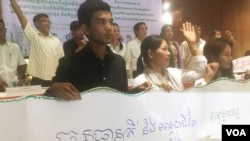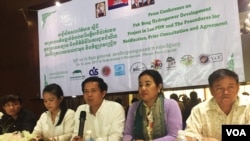Local communities in the Tonle Sap Lake region have appealed to the Laos government to immediately put on hold plans to construct the Pak Beng hydropower dam.
The 912-megawatt dam on the Mekong mainstream will significantly alter the water flow in the Mekong region, which feeds into the Tonle Sap, according to environmentalists.
Long Socheat, a community representative in the Tonle Sap region, told journalists this week that the dam would likely change the course of the Mekong river systems and negatively affect fisheries and other vital resources.
“When there is biodiversity, there will be fish to export,” he said, adding that the Pak Beng would lead to more dams being built.
He added that no officials had visited the communities on the Tonle Sap to discuss the fallout from the project if it goes ahead.
Den Volda, director of the Stung Treng community network, said: “I would like to ask the government to stop the development project of the Pak Beng hydropower dam.”
The dam will cost an estimated $2.3 billion and is scheduled to be completed in 2024.
Luy Reaksmey, executive director of the Culture and Environment Protection Association, questioned the economic as well as social and environmental logic of building the dam.
“There are no reasons that prove the assertion that the master plan will be efficient. It will cause impacts on the river and fisheries that are worth about $17 million,” he said.
The Laos government has signed power supply agreements with neighboring countries, including Cambodia, where it has agreed to send 1,500 megawatts per year by 2025.
Laos Embassy representatives could not be reached for comment.
Daovong Phonekeo, permanent secretary at Laos’ Ministry of Mines and Energy, said in an email that there was no chance that the Laos would reverse course, saying the project was part of the country’s poverty reduction plans.
“The Lao government has set the hydropower sector development as priority to combat/eradicate poverty and to provide electricity access to more [than] 95% of its people by 2020. And the Pak Beng project is one of many in the power development plan to be implemented,” he wrote.
Environmental groups have urged a “fair balance” when considering new dams on the Mekong, with International Rivers, an advocacy group, claiming that 6,700 people would be relocated as a result of Pak Beng.
Tek Vannara, executive director of the NGO Forum on Cambodia, said more needed to be done to ensure the project was socially and environmentally responsible if it was to proceed.
“But we see that the governments see more value in economic gains than environmental protection,” he said.
Souridahak Sakonhninhom, a Mekong River Commission (MRC) spokesman, said the regional grouping welcomed the views of civil society and local communities as part of its prior consultation process.
Referring to a technical assessment of the dam’s likely environmental impact by the MRC, he said the Pak Beng dam could “impact on fish passage, downstream sediment transport, and aquatic habitats. These may have knock on impacts on the people and economy of the Lower Mekong Basin.”
“Mitigation measures recommended will only partly be able to address any residual impacts on the people and economy of the area. Some impacts are unavoidable. More importantly, these impacts need to be seen in the broader development context.”






